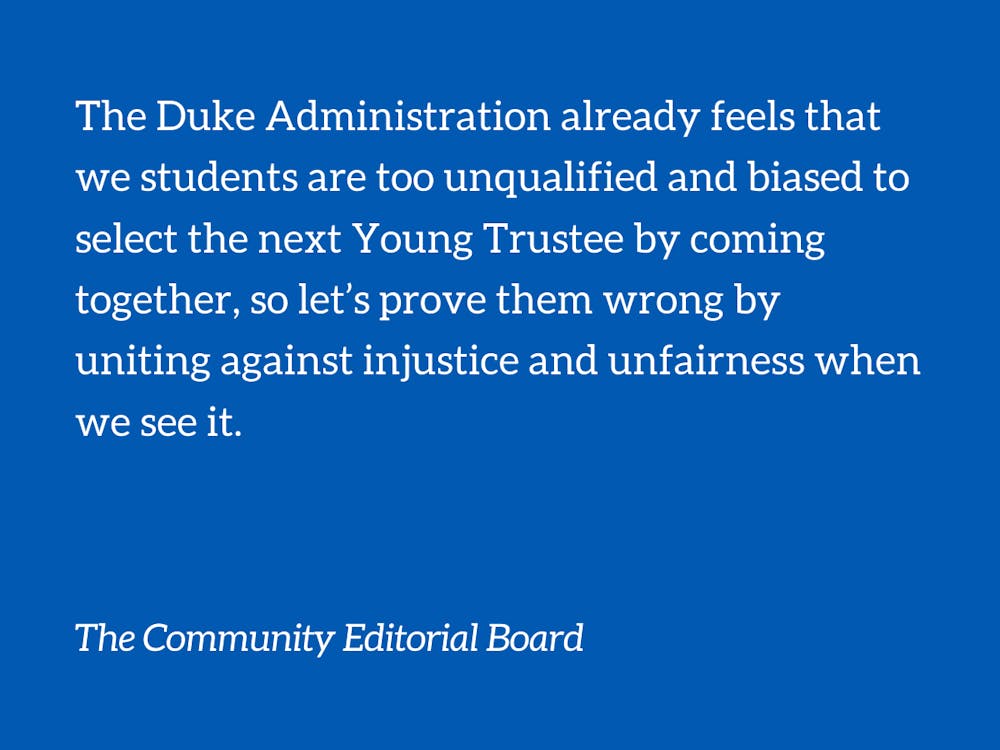We are now experiencing the repercussions of depriving the student body’s democratic voice in the Young Trustee nomination process. This Monday, a Pratt senior revealed that a Young Trustee finalist was in violation of conflict of interest standards due to his personal relationships with the majority of the Young Trustee Nominating Committee (YTNC). We support Mohammad Khatami’s guest column and consider the broader implications of his findings.
The Young Trustee is a two to three year position on the Board of Trustees given to one undergraduate and one graduate student considered to have the ability to think broadly about the university and its role in society. The position was originally designed with an election process among the student body, facilitated by DSG. However, complaints of excessive campaigning and a call for an apolitical process prompted new changes to the selection process.
The Young Trustee selection process now centers around a selection committee which includes the DSG president, the current Young Trustee and representatives from the student body. Changing this process to centralize power in a 13-member nominating committee strips decision making from the hands of students and places it in the hands of a few. However, an institution as small and intimate as Duke will suffer from inherent bias when centralizing power into the hands of any students on campus. This process decreases transparency about the decision making for one of the most powerful undergraduate positions and increases the gap between the student body and selection of this position in a way Duke Admin was hoping to fix.
It is clear that the current format does not work. The new structure rewards individuals connected to positions of power rather than incentivizing choosing the most fit individual for the position. Moreover, the current scandal was not an issue under the old system. In 2013, members of the nominating committee recused themselves from voting on candidates that presented a conflict of interest. A Young Trustee Finalist even acknowledged that applicants will inevitably be friends with some members of the nominating committee. This is in striking contrast to the members of the current nominating committee that have strong ties to a finalist but have not mentioned a conflict of interest throughout the nomination process.
Alexis Williamson, Chair of the Nominating Committee, published an article clarifying the selection process and stated that conflicts are dealt with internally. This explicit lack of transparency further shrouds the nominating process and eliminates the accountability of the committee. It is important to remember that this nominating committee is not chosen by the students. Thus, asking the student body to have blind faith in a committee that they had no input in choosing is nonsensical. On the other hand, employing an election to choose the finalist bridges this disconnect between the nominating committee and the rest of the student body. Although the nominating committee may seek to achieve equity in their nominating practice, it should remain beholden to the interest of the student body. We demand that the nominating committee explicitly share how they “internally handled” the multiple conflict of interests surrounding this year's finalists.
To be clear, this problem extends far beyond Shrey Majmudar individually. And to be fair, Mr. Majmudar is qualified. From his public LinkedIn profile, he lists 17 university committee appointments, 8 university search committees and 1 Board of Trustees committee under his belt. This is quite an impressive collection of meetings. We are sure that he has accomplished great things for the University. However, this qualified candidate partook in a broken system, and the balance of the nomination is unfairly tilted towards this candidate.
We were told that the Young Trustee was a fiduciary of the university, not a “student” trustee. We were also told that the process had become “too political.” Yet, we are expected to believe that a cabal is any better? The benefits of nominating a Young Trustee by general election lie in the transparency – finalists were held accountable for their actions and interactions with student groups, administrators and the student body. This selection by committee has felt anything but transparent.
There are numerous ways in which this new process has and can continue to go wrong. We acknowledge the challenges instituted in a general election, including how it becomes similar to a high school student government popularity contest. But this is not high school. Duke students are more than capable of seeing beyond ideological, temporary or superficial boundaries that divide us. Even more importantly, it is the responsibility of the Duke Student Government to help facilitate these elections in a way that emphasizes the importance of student voting. Instead, DSG was complacent and let Duke Admin have their way.
The Duke Administration already feels that we students are too unqualified and biased to select the next Young Trustee by coming together, so let’s prove them wrong by uniting against injustice and unfairness when we see it. We call on the Board of Trustees to revert the decision to deprive our voice and on the YTNC members with clear conflicts of interest to recuse themselves from further consideration.
NOTE: Danya Belkin and Kyle Melatti have recused themselves from this article.
The Community Editorial Board is independent from the editorial staff of The Chronicle. Their column usually runs on Tuesdays.
Get The Chronicle straight to your inbox
Signup for our weekly newsletter. Cancel at any time.

